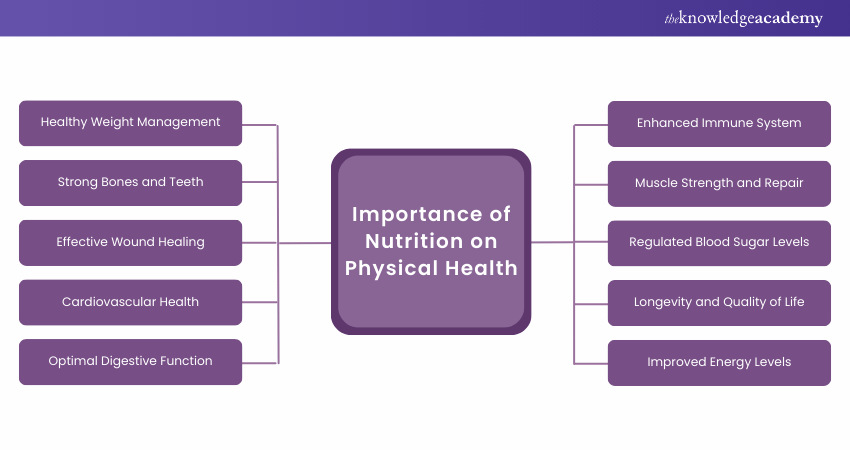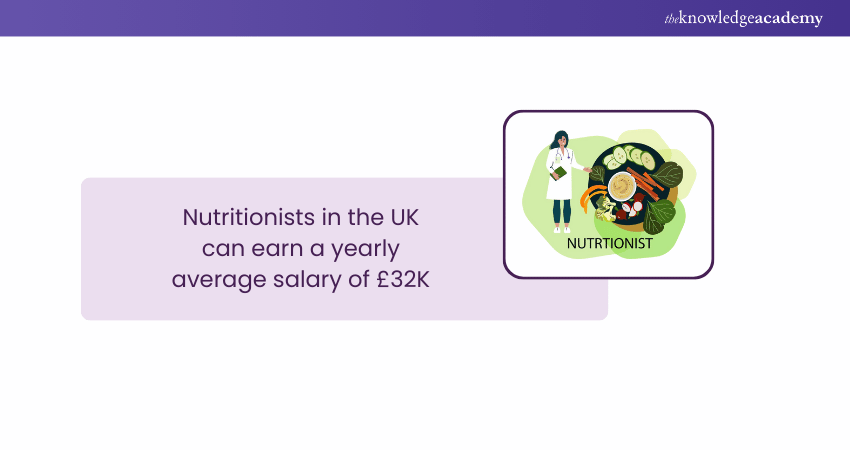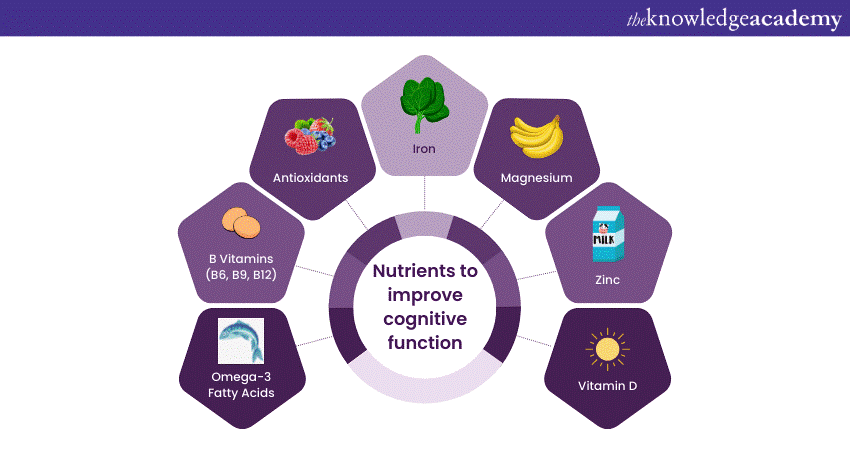We may not have the course you’re looking for. If you enquire or give us a call on +44 1344 203 999 and speak to our training experts, we may still be able to help with your training requirements.
Training Outcomes Within Your Budget!
We ensure quality, budget-alignment, and timely delivery by our expert instructors.

The human body is highly complex and functional thus giving rise to high requirements to maintain its coarse. It’s requirement encompasses having the right fuel to ensure its efficiency. This is where the Importance of Nutrition comes into the picture. From boosting one’s stamina, immunity to one’s mental well-being, proper nutrients are the real players who ensure a balanced lifestyle whilst fighting against illnesses.
The blog enumerates the Importance of Nutrition and its impact on the overall wellness. So, read on, gain deeper dietary insights and learn how nutrition can be the ultimate recipe for your physical vitality and mental clarity!
Table of Contents
1) Key Nutrients and Their Functions
2) Importance of Nutrition on Physical Health
3) Importance of Nutrition on Mental Health
4) Conclusion
Key Nutrients and Their Functions
Each nutrient plays an enormous role in supporting various physiological processes that collectively contribute to our well-being. Some of the most important types of Nutrition are as follows:

a) Carbohydrates: Carbohydrates are the primary energy source, supplying fuel for daily activities and metabolic functions. They are categorised as:
a) Simple carbohydrates like sugars
b) Complex carbohydrates like starches and fibre
Each has its distinct impact on energy levels and digestion.
b) Fats: Fats are often ignored in the diet, yet they are important for our health because they:
a) Provide energy
b) Support cell structure
c) Help in nutrient absorption (fat-soluble vitamins)
d) Regulate hormonal balance.
Healthy fats like unsaturated fats are integral to cardiac health.
c) Proteins: These are the building blocks of our body, responsible for:
a) Tissue repair
b) Muscle growth
c) Immune system support
The structural units of proteins are called Amino acids. They are vital in maintaining enzyme production and bodily functions.d) Vitamins: Vitamins are important for various bodily functions. They are categorised into the following:
a) Water-soluble vitamins: Vitamin C and vitamin B fall in this category and participate in energy metabolism and immune support
b) Fat-soluble vitamins: These include Vitamins A, D, E, and K and are involved in bone health, vision, antioxidant defence, and blood clotting.
e) Minerals:
Though required in smaller quantities, minerals are no less significant. Considers these points:
a) Calcium supports bone health
b) Iron aids in oxygen transport
c) Magnesium contributes to muscle and nerve function
Minerals maintain fluid balance and acid-base equilibriumf) Water: It is the fundamental element of life. It is indispensable for:
a) Digestion
b) Nutrient transport
c) Waste elimination
d) Temperature regulation
e) Overall bodily functions
Importance of Nutrition on Physical Health
Eating a balanced diet rich in essential nutrients is crucial for maintaining our physical well-being. It aids in keeping a good weight, fortifies bones, and guarantees optimal organ function. The key to maintaining good health and high energy levels is proper nutrition, which prevents chronic illnesses and enhances overall wellness. There are a variety of advantages to keeping up with proper nutrition:

1) Healthy Weight Management
Proper nutrition is the anchor for maintaining optimal weight. A balanced diet filled with essential nutrients fuels your body and oversees weight regulation. Individuals can effectively control their calorie intake by consuming nutrient-rich foods that provide sustained energy.
2) Strong Bones and Teeth
Adequate Nutrition is instrumental in fortifying bones and teeth. Calcium (the cornerstone of healthy bones) works with vitamin D to ensure bone density and strength. These nutrients reduce the risk of fractures and osteoporosis (a condition characterised by brittle bones). Beyond bones, proper Nutrition also extends its benefits to dental health.
Bones and teeth are crucial parts of our skeleton system which gives body the proper shape and prevents the inner organs from external damages. Ensuring adequate nutrition levels is imperative in fortifying bones and teeth. One of the crucial components to ensure the same is Calcium. Calcium along with vitamin D ensures bone density and vitality. These nutrients helps in reducing the risk of fractures and osteoporosis.
3) Effective wound healing
Our body’s ability to recover from wounds and injuries are majorly dependent on the nutrients present in the system. Nutrients like vitamin C and Zinc play an important role in tissue repair and regeneration. One should ensure that their body receives these nutrients for faster healing and recovery.
4) Cardiovascular Health
Cardiovascular health is without a doubt central to one’s wellbeing. Fruits, vegetables and whole grains contribute to a healthy cardiovascular health. These foods help with the risk of hypertension, high cholesterol levels and prevents heart disease. Modifying your diet as with these choices can lower the risk of cardiovascular issues.
Don’t wait for change—create it! Experience the benefits of Healthy Lifestyles Training and feel the difference!
5) Optimal Digestive Function
A diet rich in fibre is vital for maintaining optimal digestive function. Fibre improves regular bowel movements, prevents constipation, and supports a healthy gut microbiome. By prioritising fibre-rich foods, you can ensure that your digestive system operates smoothly and efficiently.
6) Enhanced Immune System
Proper nutrition is central to one’s immune system. Since the outbreak of pandemic in 2020, the word immunity has gained its acclaim globally. Whilst it has given us an idea of what poor immunity can do to a human, which foods actually contribute to a good immune system? Essential vitamins, minerals from a balanced diet strengthen the system’s defence mechanisms. This in turn contributes to one’s overall health and well-being.
7) Muscle Strength and Repair
Sufficient protein intake goes a long way toward supporting muscle strength and repair. Whether you're an athlete or simply physically active, protein catalyses muscle recovery and growth. It provides the building blocks for repairing tissues after physical exertion. This contributes to increased physical strength and overall fitness.
8) Regulated Blood Sugar Levels
Balanced Nutrition is key to maintaining stable blood sugar levels. By consuming a diet that includes a mix of carbohydrates, proteins, and fats, you can help regulate your blood sugar levels. This reduces the risk of diabetes and managing existing conditions more effectively.
9) Longevity and Quality of Life
A balanced diet and adequate nutrition are key to enhancing lifespan and overall well-being. Providing your body with the necessary nutrients decreases the possibility of chronic illnesses and improves your overall health. This is the way to a more enriching and healthy life.
10) Improved Energy Levels
Nutrient-heavy foods make for a steady source of energy. You can maintain stable energy levels by opting for foods rich in vitamins, minerals, and complex carbohydrates. This reduces feelings of fatigue and promotes sustained alertness and productivity.
Learn the Importance of Nutrition by signing up for our Nutrition and Fitness Training now!
Importance of Nutrition on Mental Health
The significance of nutrition extends beyond physical health; it plays a substantial role in influencing mental well-being. The connection between what we eat and how we feel is undeniable, with mounting evidence showing the profound effects of nutrition on mental health. As research advances, the importance of a balanced diet in promoting cognitive well-being becomes increasingly evident.
Nutritional Impact on Neurotransmitters
a) The brain relies on neurotransmitters to regulate mood, cognition, and behaviour.
b) Nutrients like vitamins, amino acids, and minerals are essential for neurotransmitter synthesis and function.
c) For example, tryptophan (found in protein-rich foods) is a precursor for serotonin, a neurotransmitter associated with happiness and well-being.
d) Deficiencies in these nutrients can disrupt neurotransmitter production, potentially leading to mood disorders like anxiety and depression.
Inflammation and Mental Health
a) Emerging research highlights the role of inflammation in various mental health conditions.
b) Diets high in sugars, processed foods, and unhealthy fats can trigger chronic inflammation, including in the brain.
c) This inflammatory response is linked to a higher risk of depression, anxiety, and neurodegenerative diseases.
d) Conversely, an anti-inflammatory diet rich in vegetables, fruits, and grains can help reduce inflammation and support better mental health.

Gut-Brain Axis and Mood
a) The gut-brain axis refers to the relationship between the gut and the brain.
b) The gut microbiome, a collection of microorganisms in the digestive tract, influences mental health.
c) A balanced gut microbiome is crucial for neurotransmitter production and stress regulation.
d) Consuming a diverse range of fibre-rich foods promotes a healthy gut microbiome, potentially improving mood and reducing anxiety.
Nutrient Deficiencies and Cognitive Function
a) Nutrient deficiencies can impair cognitive function, affecting memory, focus, and overall performance.
b) Key nutrients like B vitamins, omega-3 fatty acids, and antioxidants are vital for brain health.
c) Omega-3 fatty acids, found in fatty fish and certain plant sources, are particularly important for cognitive function and mood regulation.
d) Deficiencies in these nutrients can lead to cognitive decline and increased vulnerability to mental health disorders.

Blood Sugar and Mood Stability
a) Diet influences blood sugar levels, which in turn affects mood stability.
b) Sugary and refined carbohydrate-rich foods can cause blood sugar spikes and crashes, leading to mood swings and irritability.
c) Choosing complex carbohydrates that release energy slowly, along with balanced meals including protein and healthy fats, helps stabilise blood sugar levels and promotes emotional well-being.
Conclusion
The Importance of Nutrition cannot be overstated. It serves as the fundamental ingredient for holistic well-being, influencing not only physical health but also mental and emotional vitality. Good Nutrition empowers us to make informed health choices, providing our bodies and minds with the essential elements they need to thrive.
Unlock the path to promoting a healthy lifestyle with our specialised Active and Healthy Lifestyle Training. Register now and make a difference!
Frequently Asked Questions

Consequences of poor nutrition include:
a) Reduced energy levels.
b) Increased risk of malnutrition-related illnesses.
c) Weakened immunity.
d) Disrupted sleep quality.
e) Increased risk of memory problems.

Try these tips to improve your nutrition habits:
a) Include protein with every meal
b) Eat whole grains
c) Include healthful fats
d) Use extra virgin olive oil
e) Get adequate fibre to improve blood cholesterol levels
f) Increase plant foods and go for beans and pulses
g) Drink water and herbal tea

The Knowledge Academy takes global learning to new heights, offering over 30,000 online courses across 490+ locations in 220 countries. This expansive reach ensures accessibility and convenience for learners worldwide.
Alongside our diverse Online Course Catalogue, encompassing 19 major categories, we go the extra mile by providing a plethora of free educational Online Resources like News updates, Blogs, videos, webinars, and interview questions. Tailoring learning experiences further, professionals can maximise value with customisable Course Bundles of TKA.

The Knowledge Academy’s Knowledge Pass, a prepaid voucher, adds another layer of flexibility, allowing course bookings over a 12-month period. Join us on a journey where education knows no bounds.

The Knowledge Academy offers Healthy Lifestyles Training, including the Life Coach Course and the Active and Healthy Lifestyles Training. These courses cater to different skill levels, providing comprehensive insights into What is Nutrition.
Our Health & Safety Blogs cover a range of topics related to nutrition, offering valuable resources, best practices, and industry insights. Whether you are a beginner or looking to advance your knowledge base on nutrition, The Knowledge Academy's diverse courses and informative blogs have got you covered.
Upcoming Business Skills Resources Batches & Dates
Date
 Life Coach Training
Life Coach Training
Fri 28th Mar 2025
Fri 23rd May 2025
Fri 4th Jul 2025
Fri 24th Oct 2025
Fri 5th Dec 2025







 Top Rated Course
Top Rated Course



 If you wish to make any changes to your course, please
If you wish to make any changes to your course, please


